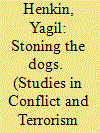|
|
|
Sort Order |
|
|
|
Items / Page
|
|
|
|
|
|
|
| Srl | Item |
| 1 |
ID:
120931


|
|
|
|
|
| Publication |
2013.
|
| Summary/Abstract |
The Fuerzas Armadas Revolucionarias de Colombia (Revolutionary Armed Forces of Colombia-FARC) was originally founded to protect Colombian peasants from harsh landowner policies in exchange for food and supplies. Over time, it has evolved into an internationally connected, narco-trafficking organization that displays little concern for the peasants it once vowed to protect. In recent years, Colombian authorities have become more adept at countering the FARC, forcing it to operate increasingly outside of Colombia. The FARC's transformation from a local insurgency into an internationally connected one is the focus of this article. Using social network analysis it identifies key leaders who are tied to this transformation and discusses implications concerning the FARC's future.
|
|
|
|
|
|
|
|
|
|
|
|
|
|
|
|
| 2 |
ID:
120929


|
|
|
|
|
| Publication |
2013.
|
| Summary/Abstract |
The purpose of this article is to inform the debate about strategies and options for countering online radicalization within the U.S. domestic context. Its aim is to provide a better understanding of how the Internet facilitates radicalization; an appreciation of the dilemmas and tradeoffs that are involved in countering online radicalization within the United States; and ideas and best practices for making the emerging approach and strategy richer and more effective. It argues that online radicalization can be dealt with in three ways. Approaches aimed at restricting freedom of speech and removing content from the Internet are not only the least desirable, they are also the least effective. Instead, government should play a more energetic role in reducing the demand for radicalization and violent extremist messages-for example, by encouraging civic challenges to extremist narratives and by promoting awareness and education of young people. In the short term, the most promising way for dealing with the presence of violent extremists and their propaganda on the Internet is to exploit their online communications to gain intelligence and gather evidence in the most comprehensive and systematic fashion possible.
|
|
|
|
|
|
|
|
|
|
|
|
|
|
|
|
| 3 |
ID:
120930


|
|
|
|
|
| Publication |
2013.
|
| Summary/Abstract |
This article documents strategies and tactics of social control used by the U.S. government to detect and deter financing of radical Islamic, terrorist-labeled organizations. Through grounded theory, social control strategies were identified based on data from congressional committee hearings from 1999 to 2011. Findings revealed the presence of nine such strategies: (1) discover sources of funding, (2) deny or restrict access to money, (3) establish information networks and communication norms, (4) create derogatory labels, (5) influence the media, (6) impose legal sanctions, (7) offer financial incentives, (8) construct a shared collective identity, and (9) force terrorist-labeled organizations on the defensive.
|
|
|
|
|
|
|
|
|
|
|
|
|
|
|
|
| 4 |
ID:
120932


|
|
|
|
|
| Publication |
2013.
|
| Summary/Abstract |
Rhodesia, a breakaway British colony, was engulfed in an insurgency through much of its short history. African guerillas, rebelling against the white minority government, have killed many more African civilians during the war-the same group that formed their base of support-than either government soldiers or European civilians. The violence was not only intended to punish enemies of the guerilla-traitors or collaborators with the government. Nor was it the result of lack of popular support. Violence forced guerilla sympathizers to actively support the insurgency or participate in it, despite the considerable risks this participation carried. Political support should not be mistaken with mobilization. Without violence, the lack of benefits and the danger of government reprisal may have kept many from actively assisting the insurgency, despite politically identifying with the guerillas and hoping for their victory.
|
|
|
|
|
|
|
|
|
|
|
|
|
|
|
|
|
|
|
|
|